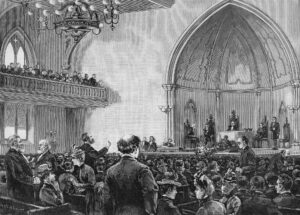For some reading this, over the next few Sundays, you will partake of the Lord’s Supper, Holy Communion, for the first time in several months. For others, it might be the first time since March of 2020. For still others, your health and/or concerns about COVID mean that you will wait a while longer before returning to in-person worship. For all of us, this is a good season to reflect upon the Lord’s Supper.
One of the mature fruits of the English Reformation is the 1662 Book of Common Prayer. Its Communion service is virtually unchanged from 1552. The Communion service in its “official” form contains three different exhortations concerning the importance of partaking of the Lord’s Supper in a worthy, and regular manner. These three exhortations are not normally included in the service that people actually attend. As a result, many people are completely unaware of their existence.
This is the second of three articles where I give you the exhortation. In each case, I have gently updated the language. This exhortation is an alternative to the first. Some arguments work with some people and not with others. That is just life.
This exhortation fits with the first but employs a different argument. I will add some comments at the end.
The Second Exhortation
Dearly beloved brothers and sisters, on this Sunday I intend, by God’s grace, to celebrate the Lord’s supper. Unto which, on God’s behalf, I bid you all who are here present, and beseech you, for the Lord Jesus Christ’s sake, that you will not refuse to come to the Lord’s supper, being so lovingly called and bidden by God Himself. You know how grievous and unkind a thing it is, when someone has prepared a rich feast – decked their table with all kinds of provision, so that there lacks nothing but the guests to sit down – and yet those who are called (without any cause) most unthankfully refuse to come. Which of you in such a case would not be moved? Who would not think a great ingratitude and wrong done unto them? Wherefore, most dearly beloved in Christ, take good heed, lest you, withdrawing yourselves from this holy supper, provoke God’s indignation against you.
It is an easy matter for a person to say, “I will not communicate, because I am otherwise hindered with worldly business.” But such excuses are not so easily accepted and allowed before God. If any person says, “I am a grievous sinner, and therefore am afraid to come”, why then do you not repent and amend your life? When God calls you, are you not ashamed to say that you will not come? When you should return to God, will you excuse yourselves, and say that you are not ready? Consider earnestly with yourselves how little such feigned excuses will avail before God. Those who refused the feast in the gospel, because they had bought a farm, or would try their yokes of oxen, or because they were married, were not so easily excused, but counted unworthy of the heavenly feast.
I, for my part, shall be ready. And according to my office, I bid you in the name of God, I call you on Christ’s behalf, I exhort you as you love your own salvation, that you will be partakers of this holy communion. And as the Son of God did graciously grant to yield up His soul by death upon the cross for our salvation, so it is your duty to receive the communion in remembrance of the sacrifice of His death, as He Himself commanded – which if you shall neglect to do, consider with yourselves how great is your ingratitude to God, and what sore punishment hangs over your heads for the ingratitude, when you willfully abstain from the Lord’s table, and separate from your brothers and sisters who come to feed on that banquet of that most heavenly food.
These things if you earnestly consider, you will by God’s grace return to a better mind, for the obtaining of which we shall not cease to make our humble petitions unto almighty God our heavenly Father.
First, many evangelical churches in Canada function as if the Lord’s Supper is not important.
It feels like singing is better at connecting you to God. It seems like the Lord’s Supper is a barrier to evangelism, either because it makes the service longer, or because it excludes the non-Christians that are present, or because it feels odd to ask non-Christians to leave. It sometimes seems “wiser” to schedule communion at a different (hard to attend) time because Sunday morning time is tight. In the press of other good things (Sunday School picnic? Christmas Pageant? Special service?), it seems wise to dispense with Communion this month. Before you know it, your church does not actually have the Lord’s Supper as often as you think it does. Your reasoning reveals that you do not believe the Lord’s Supper was instituted by Christ and that He commanded you to partake of it regularly.
This exhortation does not tell you how often your church should have the Lord’s Supper. But it does make clear that the Lord’s Supper is important – too important to be “bumped” by Mothers Day or Canada Day or some other day. After your church has come to a prayerful and biblical discernment about the frequency of offering the Lord’s Supper, then the Lord’s Supper should bump your “days” and your “days” should probably not bump the Lord’s Supper.
Second, many Christians function as if the Lord’s Supper is not important.
This of course is the primary target of the exhortation. The problem is that you do not understand “the means of grace.” You confuse certain pleasant emotions with God working in your life – in other words, if you have these emotions, then God is at work; if you do not have these emotions, then God is not at work. Many people find Communion boring and uninspiring. But the Bible never connects particular emotions with God working in your life. What the Bible does teach is that God gives grace. He asks you to do certain things in obedience, and He will do what only He can do, give us grace and blessing. The Lord’s Supper is an “ordinance” or “sacrament” given by Christ Himself. It is a means of grace.
Third, pray that your church will have a biblically wise balance between the preaching of the word, the celebration of the Lord’s Supper, and the other parts of a worship service that are wise to have.
Many Anglican churches have shrunk the sermon to ten minutes, and amped up time spent on the Lord’s Supper and other stuff. As Terry Fulham said years ago, “Sermonettes produce Christianettes.” Other churches spend as little time as possible with the Lord’s Supper, (when they are not bumping the Lord’s Supper) that they have gone in the other direction. Mindful of the best of your theological heritage, pray for a wise balance.
Fourth, even the saved can (and do) grieve and anger the Lord.
This exhortation is a bit shocking to Christians who think that salvation by grace alone, through faith alone, in Christ alone means that the Lord ignores your daily sin or hardness of heart and is never displeased or grieved by your actions and inaction. In the new heaven and the new earth you will be perfect. Until then, you are a redeemed sinner who sins. The point of the exhortation is to awaken you from a fog of confusion. The Lord of the universe longs for communion with you. How can you ignore that? Like the Bible, this exhortation does not confront you to belittle you, but to bring you back to Him to connect with Him.
























